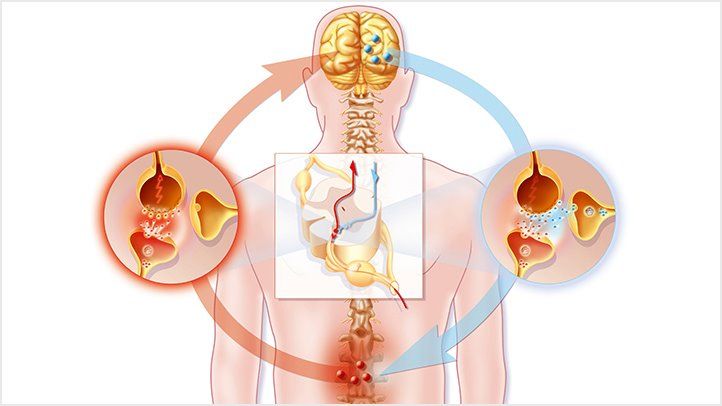Neuropathic Pain: Types, Diagnosis, and Treatment Options
Neuropathic pain is a complex condition that arises from damage or dysfunction to the nervous system. Unlike nociceptive pain, which results from tissue damage, neuropathic pain originates from abnormalities in the nerves themselves. Neuropathic pain can be mild or severe, and it may come and go or linger.
Let’s explore the different types of neuropathic pain and its symptoms, along with the various treatment options available.
Types of Neuropathic Pain
Neuropathic pain can manifest in various forms. Common types include:
- Peripheral neuropathy. Damage to the peripheral nerves, often associated with conditions like diabetes, infections or trauma, can lead to peripheral neuropathy. Symptoms may include tingling, numbness and burning sensations.
- Diabetic neuropathy. A specific type of peripheral neuropathy, diabetic neuropathy results from prolonged high blood sugar levels in individuals with diabetes. It commonly affects the feet and legs and may cause pain, tingling or loss of sensation.
- Postherpetic neuralgia. This neuropathic pain arises as a complication of shingles and can persist long after the rash has healed. Individuals may experience sharp, stabbing pain in the affected area.
- Complex Regional Pain Syndrome (CRPS). CRPS is a chronic pain condition characterized by severe, continuous pain, typically affecting an arm or leg. It often follows an injury or trauma.
Diagnosing Neuropathic Pain
Diagnosing neuropathic pain can be challenging due to its subjective nature. Pain management specialists will typically use a combination of diagnostic tests to identify and classify neuropathic pain.
Common diagnostic tools include:
- Medical history. Your doctor will have a detailed discussion with you about your symptoms and medical history.
- Physical examinations. Neurological examinations help assess sensory function, reflexes and muscle strength, providing valuable information about nerve damage.
- Electromyography (EMG) and nerve conduction studies. These tests measure the electrical activity of muscles and the speed of nerve signals, helping to identify nerve damage and its severity.
- Imaging studies. Magnetic resonance imaging (MRI) and computed tomography (CT) scans can help identify structural abnormalities in the nerves or surrounding tissues.
Treatment Options for Neuropathic Pain
Managing neuropathic pain often involves a multimodal approach tailored to the specific type of pain you’re experiencing and the severity of your condition. Treatment options may include:
- Medications. Antidepressants (SSRIs, SNRIs) can help alleviate neuropathic pain. Anticonvulsants, such as gabapentin and pregabalin, are also effective in managing neuropathic pain.
- Physical therapy. Targeted exercises and physical therapy can improve muscle strength, flexibility and overall functioning, reducing the impact of neuropathic pain.
- Alternative therapies. Alternative therapies like massage therapy, acupuncture, herbal supplements, meditation and mindfulness are all options that can help reduce pain and manage the emotional aspects of living with neuropathic pain.
- Nerve blocks and injections. Local anesthetics or steroids can be injected to block nerve signals and provide temporary relief from neuropathic pain.
- Platelet-rich plasma therapy. PRP encourages repair and regeneration of nerve tissue. This can reduce neuropathic pain and increase sensation. Some patients see results in just two weeks.
- Stem cell therapy. Stem cell therapy uses stem cells to regenerate damaged nerve cells and improve nerve function. Also, stem cells have anti-inflammatory properties that can be beneficial in treating certain nerve conditions.
- Transcutaneous Electrical Nerve Stimulation (TENS). TENS units deliver mild electrical impulses to nerves, helping to alleviate pain by disrupting pain signals.
- Lifestyle modifications. Lifestyle changes, such as maintaining a healthy diet, managing underlying conditions and avoiding exacerbating factors, can contribute to pain management.
Treat Neuropathic Pain and Improve Your Quality of Life
Neuropathic pain poses significant challenges for both patients and healthcare providers. Through a comprehensive approach involving accurate diagnosis, targeted treatment and ongoing management, individuals with neuropathic pain can find relief and improve their quality of life. To learn more about treating your neuropathic pain, schedule an appointment with Jersey Rehab today.

